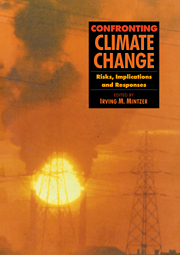Book contents
- Frontmatter
- Contents
- Foreword
- Acknowledgements
- List of Reviewers
- 1 Living in a Warming World
- I The Science of Climate Change
- II Impacts of Global Climate Change
- III Energy Use and Technology
- IV Economics and the Role of Institutions
- 15 The Economics of Near-Term Reductions in Greenhouse Gases
- 16 “Wait and See” versus “No Regrets”: Comparing the Costs of Economic Strategies
- 17 International Organisations in a Warming World: Building a Global Climate Regime
- 18 Modifying the Mandate of Existing Institutions: NGOs
- 19 Modifying the Mandate of Existing Institutions: Corporations
- 20 International Trade, Technology Transfer and Climate Change
- V Equity Considerations and Future Negotiations
- Annex I
- Annex II
- Glossary
- Index
19 - Modifying the Mandate of Existing Institutions: Corporations
Published online by Cambridge University Press: 06 January 2010
- Frontmatter
- Contents
- Foreword
- Acknowledgements
- List of Reviewers
- 1 Living in a Warming World
- I The Science of Climate Change
- II Impacts of Global Climate Change
- III Energy Use and Technology
- IV Economics and the Role of Institutions
- 15 The Economics of Near-Term Reductions in Greenhouse Gases
- 16 “Wait and See” versus “No Regrets”: Comparing the Costs of Economic Strategies
- 17 International Organisations in a Warming World: Building a Global Climate Regime
- 18 Modifying the Mandate of Existing Institutions: NGOs
- 19 Modifying the Mandate of Existing Institutions: Corporations
- 20 International Trade, Technology Transfer and Climate Change
- V Equity Considerations and Future Negotiations
- Annex I
- Annex II
- Glossary
- Index
Summary
Editor's Introduction
In the last 30 years, corporations have taken on an increasingly important role in the world economy. Investment decisions made by corporations shape the development patterns of large regions, the goals and means of national economies and the direction of international trade. In many cases, the technological choices made in conjunction with these decisions will determine for decades to come the timing, character, and volume of greenhouse gas emissions.
But the relationship between corporations and the environment is more than a one-way street. Few people, either inside or outside corporations yet realize how much these entities will be affected by the policy decisions made in response to the perceived risks of rapid climate change. Initiatives taken by governments, lending policy decisions made by multi-lateral banks and other development assistance agencies, and campaigns led by activists will all contribute to the climate of financial risks in which strategic planning and investment decisions by corporations play out. And, of course, the lands held by corporations, and the workforces that they employ, are as subject to the forces of climate as any other lands or workforces.
Many see the political forces of the climate change debate as unequivocally hostile to the interests of the corporation, and its need to preserve profitability in a changing world, but Peter Schwartz, Napier Collyns, Ken Hamik and Joe Henri have a broader and more sophisticated understanding of the challenges that environmental issues pose for the modern corporation. Schwartz et al. observe that corporate concern with the environment is not a form of altruism, but a practical response to the concerns of both shareholders and regulators.
- Type
- Chapter
- Information
- Confronting Climate ChangeRisks, Implications and Responses, pp. 281 - 294Publisher: Cambridge University PressPrint publication year: 1992
- 1
- Cited by

